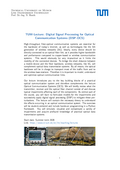Digital Signal Processing for Optical Communication Systems
| Lecturer (assistant) | |
|---|---|
| Number | 0000005394 |
| Type | lecture with integrated exercises |
| Duration | 4 SWS |
| Term | Sommersemester 2023 |
| Language of instruction | English |
| Position within curricula | See TUMonline |
| Dates | See TUMonline |
Description
Overview of key building blocks of optical communication systems (laser, Mach-Zehnder modulator, fiber, optical amplifier, photo diode, coherent receiver, DSP).
Hands-on introduction into simulation of digital communication systems (QAM, sampling, pulse shaping, AWGN, matched filter, equalization, Monte Carlo simulations).
Overview of distortions in optical communication systems (laser phase noise, frequency offset, chromatic dispersion, polarization mode dispersion, fiber nonlinearities)
Digital signal processing methods to guarantee error-free operation (clock recovery, carrier phase estimation, frequency offset estimation, static and adaptive equalization).
Hands-on introduction into simulation of digital communication systems (QAM, sampling, pulse shaping, AWGN, matched filter, equalization, Monte Carlo simulations).
Overview of distortions in optical communication systems (laser phase noise, frequency offset, chromatic dispersion, polarization mode dispersion, fiber nonlinearities)
Digital signal processing methods to guarantee error-free operation (clock recovery, carrier phase estimation, frequency offset estimation, static and adaptive equalization).
Prerequisites
Knowledge on linear algebra and digital communication systems (modulation, signal description in time and frequency, system theory).
The lecture Optical Communication Systems by Prof. Hanik is strongly recommended.
Experience in Python/MATLAB is a plus.
The lecture Optical Communication Systems by Prof. Hanik is strongly recommended.
Experience in Python/MATLAB is a plus.
